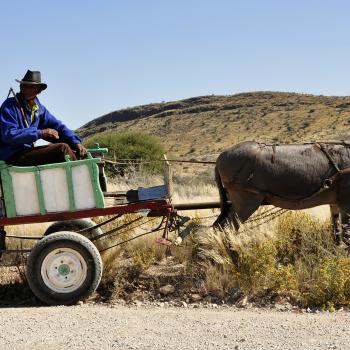Love Comes Softly, ch. 1 part 1
Guess what guys? It’s time for a new review series! I will be reviewing Janette Oke’s Love Comes Softly series bit by bit over the next couple of months, with a new installment every Friday.
I read Love Comes Softly as a young teen. I then reread it, and reread it, and read all of its sequels. The book is about a young woman (Marty) who finds herself widowed out West and marries a widower (Clark) with a small daughter out of necessity. The two have an arrangement that Marty can go back east in the spring if she wants to, but of course, by then she decides to stay.
The book is that it portrays a couple gradually falling in love while already living together as a married couple—in every way but one. The result is a bit of sexual tension, and that the two begin to notice each other gradually, in ways I found quite exciting as a teen with limited access to more overtly sexual reading material. It’s no surprise that this book was so popular in evangelical circles.
Quick note before I begin! This book is far better written than anything I’ve reviewed here before, thought it does have a few foibles (one of which we’ll get to in this chapter). And, thankfully, Love Comes Softly lacks the abusive themes so present in Francine Rivers’ A Voice in the Wind series.
Because I hadn’t remembered how abusive the characters in A Voice in the Wind were until I reread it, I reread Love Comes Softly with some trepidation. I was so nervous that I was almost physically relieved when I found that Clark was a genuinely nice person. It was incredibly refreshing. That said, abuse does come up in tangential storylines, and it could be handled better.
Before I get started, I want to offer some background on the author. Janette Oke was born in 1935 and grew up on a farm in Alberta, Canada. She went to Mountain View Bible College, also in Alberta, and married in 1957. Her husband, a graduate of the same Bible college, was a pastor; the couple, who soon had four children, were stationed in various churches in Indiana and Canada. Ultimately, Oke’s husband became president of Mountain View Bible College.
At some point along this journey, Janette Oke began writing, primarily novels. She became a very popular author in evangelical Christian circles, and is perhaps best known for her Love Comes Softly series. Oke published Love Comes Softly, the first book in the series, in 1979. So, this book actually predates the Christian homeschooling movement I grew up in—or rather, it was written just as that movement was about to take off.
Now, let’s get into the book! I plan to go through this book more quickly than some of the others I have reviewed. but I found that I needed to divide mic overage of the first chapter into two posts, given how much there is to discuss in how the book is set up.
Chapter 1 is titled “The Grim Reaper.” The book is written from Marty’s perspective, but is not in first person. It begins like this:
The morning sun shone brightly on the canvas of the covered wagon, promising an unseasonably warm day for mid-October. Marty fought for wakefulness, coming slowly out of a troubled and fitful sleep. Why did she feel so heavy and ill at ease—she who usually woke with enthusiasm and readiness for each new day’s adventure? Then it all came flooding back, and she fell in a heap on the quilt from which she had just emerged.
Marty had come west with her husband of less than a year, Clem. We learn that Marty is pregnant, and that Clem has died. (Marty, we learn later, is nineteen.) Oke uses most of this first chapter to set the stage, but she leaves a number of points frustratingly vague.
Oke tells us that Marty and Clem traveled with a wagon train until “they had come upon a farmhouse in an area of rolling hills and pastureland.” At that point Marty and Clem stopped to make inquiries. (The rest of the wagon trail, presumably, went on without them.) Oke tells us that it is fall, but that Clem assured Marty that the neighbors would help them put up a cabin before winter.
Clem asked around and found that there was land nearby that hadn’t been claimed. They turned their wagon toward that land, and then stopped for the night. In the morning they woke to find one of the horses gone. Clem went after it on the other, and died in an accident. On top of that, one of the wagon’s wheels broke.
As Oke relates this, she includes bits like this:
Clem had come out west with such wild excitement.
“We’ll find everything we want there in thet new country. The land’s there fer the takin’,” he had exulted.
“What ’bout the wild animals—an’ the Injuns?” she had stammered.
He had laughed at her silliness, picked her up in his strong arms, and whirled her around in the air.
This is the only time we hear of Native Americans in this book. It appears that the area where Clem and Marty stopped must be settled enough that there are no Native Americans left in the area. But this is frustrating, because I’m left with a thousand questions.
Where exactly did they stop? Oke never says. In the whole book, we never learn where they are. They are “out west.” That’s all we need to know, apparently. The movie series based on this book identifies the location as Montana. Let’s assume that’s the case.
We’re also not told when this book takes place. Even the wiki for the movie series simply says it is “set in the 19th century.” Presumably, the year is somewhere between the 1850s and the 1870s, which is when white colonists populated Montana. (And yes, in case you’re wondering, these decades were peppered with massacres of the region’s Native American population.)
There don’t appear to be trains yet, though—travel is by wagon train and stagecoach—so it has to be before 1869. The first towns were founded in Montana in the early 1860s, and this book features a good-sized established town, so it has to be after that. That puts the book in the mid 1860s, but there’s no mention at all of the Civil War back east, whether it’s ongoing or just finished. The first people to come to Montana came as part of a series of gold rushes in the late 1850s and early 1860s, but gold isn’t mentioned at all in this book. I don’t think this book knows that it’s set in Montana.
In fact, I’m pretty sure that Clem and Marty have traveled to and settled in fake West, not to be confused with the actual West. It’s a proximation. This isn’t really historical fiction. It’s more rough historical backdrop—they’re out west, there’s a town, there are families settled around it (farming or ranching), travel is arduous, and it’s the 1800s. That’s all you really need to know.
All of this aside you probably noticed something else in the section I quoted above, too—the dialect. If I had to pick my two biggest pet peeves in this book, it would be the lack of specifics regarding when and where the book is set, and the dialect. Each time Oke includes dialogue, her characters speak in dialect. It’s all “thet” and “fer” and “iffen.” It feels off because everything else is written in standard English, including Marty’s internal musings. It reads as though she thinks in standard English and speaks in dialect, which is weird.
Presumably, Oke’s use of dialect is designed to show that her characters are down home, country people. They’re not wealthy or educated. Okay, fine. But I genuinely don’t think the benefits of using dialect to show that is worth how hard it is to read.
Let me give you an example. The neighbors all start arriving to help Marty bury Clem (the preacher is in town, but is leaving soon, so they have to move quickly). Some neighbors offer to let Marty stay with them for a few days. Ma Graham states her offer like this:
“This ain’t an easy time fer ya, I know. I buried my first husband many years ago, and I know how you’re feelin’.” She paused for a minute and then went on. “I don’t s’pose you’ve had ya time to plan.” At the slight shake of Marty’s head, she continued. “I can’t offer ya a place to stay; we’re full up at our place. But I can offer ya something’ to eat, and iffen you’d like to move yer wagon to our yard, we’d be happy to help ya pack yer things, and my Ben, Ben Graham, will be more’n glad to help ya git to town whenever yer ready to go.”
You see what I mean?
If she’d wanted to, Oke could have let us know about these folks’ humble roots by sharing their backstories. But she doesn’t! This also drove me bonkers when I reread the book. Oke never says where Marty was from. We learn that she can’t cook anything but pancakes, and we’re given a few hints that her family didn’t have much. But that’s it. What did her parents do? What was her relationship with her family like? We don’t know.
And we never learn anything—literally anything—about Clark’s family or background. Wait. I’m getting ahead of myself here.
Marty turns down Ma Graham’s offer because she has no money to pay for someone to put her up in town (she does not, however, tell Ma Graham or anyone else that she has no money). Oke doesn’t explain how Clem intended to buy a claim and get a start with (apparently) no money at all. Oke also doesn’t explain why Marty can’t sell her remaining supplies and possessions. Surely she has some things that could fetch a price, whether here or in town.
Is there a reason Marty can’t go to the town nearby and ask if anyone needs a shop assistant, or a seamstress, just for the winter? While she can’t cook, we later learn that she can sew—well. Why can’t she board with someone in town in exchange for work, and save a bit towards travel expenses in the spring?
Marty may be in no state to figure all of this out right now, but you’d think someone could help her talk through her options rather than assuming she has headspace herself. She very clearly doesn’t, and as a result she doesn’t think she has any options.
Everyone’s kindly offers amount to “we’ll let you stay with us for a few days and then take you to town to await transport in the spring.” No one gives her any information about the town or what opportunities it might offer—families that board people in exchange for work, or a dressmaker or shopkeeper who is hiring. Nothing. All she gets is “we’ll take you to town and leave you there.”
These down country folks are being less helpful than they think they are—including Ma Graham. Perhaps especially Ma Graham. We later learn that she basically runs the place, and that she’s ever kind and intuitive and thoughtful and she understands so much of life. But she couldn’t see that Marty was freaking out, and say something? She couldn’t help Marty assess what she has?
It’s no wonder Marty feels she has no choice but to accept Clark’s offer. But we’ll get to that next week!
I have a Patreon! Please support my writing!














